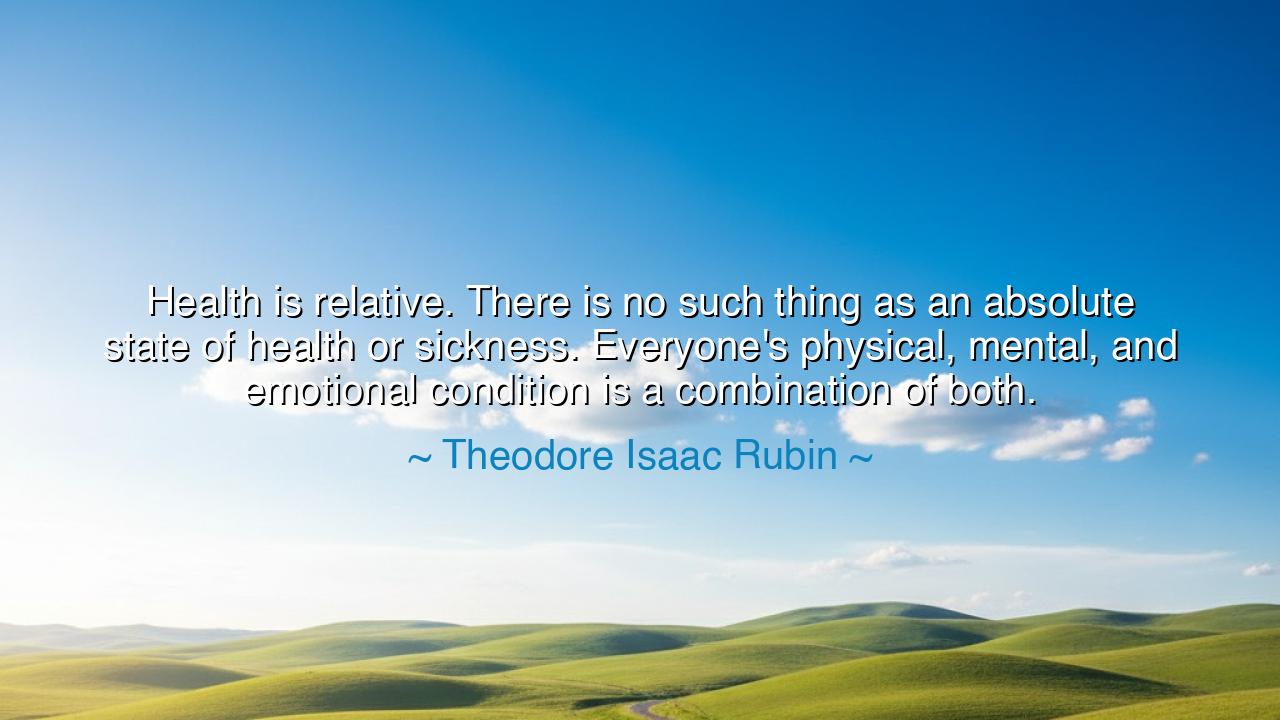
Health is relative. There is no such thing as an absolute state
Health is relative. There is no such thing as an absolute state of health or sickness. Everyone's physical, mental, and emotional condition is a combination of both.






The healer Theodore Isaac Rubin once spoke a truth that pierces the illusions of both physicians and philosophers: “Health is relative. There is no such thing as an absolute state of health or sickness. Everyone’s physical, mental, and emotional condition is a combination of both.” These words are not the counsel of a doctor alone—they are the song of one who has looked upon the mystery of life and seen its balance of light and shadow. Health, in Rubin’s vision, is not the still perfection of marble, but the living harmony of change. It is not the absence of pain, nor the endless bloom of strength, but the constant weaving of weakness and vitality, despair and joy, into the single fabric of being.
In the wisdom of the ancients, men sought perfection in body and spirit. Yet those who truly saw—those who listened to the pulse of nature—knew that perfection is a myth, and balance is the greater truth. The sun that shines without cloud burns the earth; the rain that never ceases drowns it. So too, the human soul must live between extremes. To be alive is to sway between health and illness, clarity and confusion, peace and unrest. Rubin reminds us that the human being is not a fixed sculpture of wellness but a river in motion, sometimes serene, sometimes stormed, yet always flowing toward renewal.
Consider the life of Helen Keller, who was both blind and deaf from childhood. By the world’s measure, she was “unwell,” trapped in darkness and silence. Yet within her beat a mind of light, a will of fire. Guided by her teacher Anne Sullivan, she found her way into the language of the soul. Though her body bore the marks of limitation, her spirit towered above kingdoms. Was she sick, or was she whole? Rubin’s wisdom tells us that she was both—that she embodied the eternal truth that health is a combination of brokenness and beauty, of shadow and light.
There is danger, dear listener, in the illusion of the absolute. When we believe that health means perfection, we begin to despise our wounds. We chase an unreachable state, comparing our lives to the false idols of invincibility. But the wise know that even the strongest warrior limps, even the happiest heart has its ache. To live wisely is to cease warring against imperfection and instead learn its rhythm—to befriend one’s own imbalance and guide it gently toward harmony.
The philosopher once said that “to suffer is to live.” Yet Rubin transforms that saying: to suffer and to heal are not opposites—they are dance partners. The mind that trembles with fear one day may bloom with courage the next; the body that weakens in sickness learns new humility and strength. There is no clear line dividing wellness from illness, for both dwell in the same house. Every joy carries the seed of fragility, and every sorrow carries the seed of growth. The wise soul tends both gardens, knowing that each nourishes the other.
Therefore, when you look upon your own pain, do not curse it as an invader. Ask instead what lesson it carries. The aching body may teach gratitude for motion; the restless mind may awaken compassion; the grieving heart may open the door to wisdom. These are not afflictions—they are teachers disguised in suffering. To see this truth is to live as Rubin counsels: not in denial of sickness, nor in worship of health, but in reverence for their eternal companionship.
The lesson is this: accept your condition as a sacred mixture. Do not seek to be entirely whole, for wholeness is not purity—it is integration. To be truly healthy is to know your limits, to tend your weaknesses, to care for your mind as tenderly as for your body. Each day, breathe into your imbalance and find balance anew. Rest when weary, stand when ready, and let your soul’s seasons unfold without shame.
And so, children of flesh and spirit, remember: there is no absolute health, no eternal sickness. The pulse of life beats in contradiction, yet within that rhythm lies harmony. Honor both your strength and your struggle, for together they form the music of being alive. Let your health be not the stillness of stone, but the movement of wind and tide—ever changing, ever growing, ever whole.






AAdministratorAdministrator
Welcome, honored guests. Please leave a comment, we will respond soon